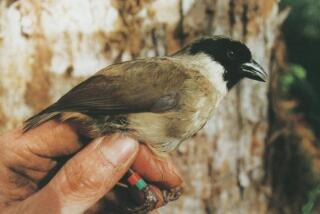Most Extinctions Since Dinosaur Age : Up to 1 Million Species Might Die Off by 2000, Survey Warns
- Share via
WASHINGTON — Up to 1 million species of plants and animals could die by the turn of the century in the greatest wave of extinctions since the age of the dinosaur, according to an international survey of conservationists.
The survey, published in the May-June issue of International Wildlife, the magazine of the National Wildlife Federation, outlines a “grim scenario for the future of our natural world.”
Of the 245 conservationists, scientists and government officials surveyed, 57% said humans are falling behind in their ability to deal with losses of living species, even though 64% agreed that conservationists do a better job now than they did 10 years ago.
Expected Before 2000
Despite those efforts, the experts forecast massive die-offs of plant and animal species before the year 2000. Fifty-five percent of those questioned predicted that between 10,000 and 1 million species, including insects, would disappear by the end of the century.
Thirty percent said up to 10,000 species would die off and 15% said the toll would top 1 million.
According to their calculations, extinctions will be more widespread than they have been during any equivalent time since the age of the dinosaurs, said the report by Jonathan Fisher, managing editor of International Wildlife, and ecologist Norman Myers.
Seventy-two percent of the experts blamed the expanding human population for the troubles facing the world’s wildlife and 97% endorsed “dramatic increases in population planning programs or moderate advocacy of such efforts.”
Africa Named Hardest Hit
The survey also found the world’s most serious environmental problems are in Africa, according to 55% of those questioned. Other continents were singled out by smaller numbers, with Asia named by 16%; South America, 14%; Central America, 8%; Europe, 5% and Australia, 2%. None of the experts named North America.
Tropical forests face more sweeping changes than any other ecosystems, the report said, adding: “About 40% of these jungles have been cleared and the rest are disappearing fast.”
The experts were divided on whether some “doomed” species should be permitted to die off without a fight while resources are directed toward saving other plants and animals. Forty-six percent endorsed--and 54% opposed--what the report called “a form of species triage . . . to allow a few species to die out in order to use scarce funding to help many others.”
Damage May Be Irreversible
They were similarly split on the question of whether money should be channeled into countries “where the conservation payoff will be greatest” and risk ignoring other nations with major problems.
Forty-two percent agreed that some countries “may have already passed the point of environmental no-return” and should be written off so funds can be diverted to more promising projects elsewhere. The other 58% disagreed.
More to Read
Sign up for Essential California
The most important California stories and recommendations in your inbox every morning.
You may occasionally receive promotional content from the Los Angeles Times.













